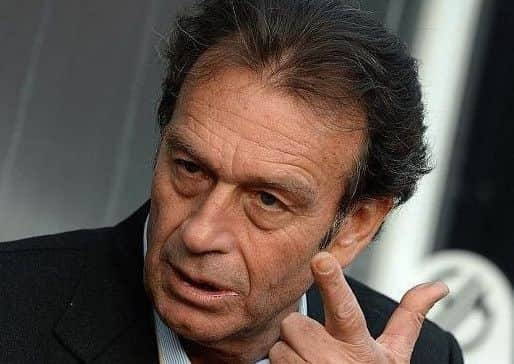Leeds United: FA report into McCormack transfer exposes unedifying web of lies - Hay


According to documents released by the Football Association on Monday, Cellino “had not been interested in transferring the player” until it was suggested that £10m would be paid for McCormack’s signature.
The club did slightly better than that, agreeing a fee of £10.75m with Fulham, but McCormack’s sale in the third month of Cellino’s reign as owner began the messy disciplinary process which finally finished this week with another ruling against him. His involvement in English football ends with a 12-month ban, a £100,000 fine and a case which captures in one snapshot the fraught manner of so much of his management of Leeds.
Advertisement
Hide AdAdvertisement
Hide AdThe charges against him concerned a deal to pay £250,000 to Barry Hughes, a Glasgow businessman who managed world featherweight champion Scott Harrison and was convicted of fraud shortly before the McCormack transfer. Hughes worked as an unregistered advisor for McCormack but, without an FA licence, was forbidden from acting as an agent or earning directly from the striker’s sale. McCormack’s move to Fulham was arranged by Mark Donaghy of Arena Sports Management, a licensed agent whose fees ran to a legitimate £875,000.


The FA’s ruling against Cellino states that it was Hughes who first indicated that he could secure £10m for McCormack and in the weeks after the completion of the move to Craven Cottage, he invoiced Leeds for agency fees worth £250,000. Leeds, for whom ex-FA compliance officer Graham Bean was working as a consultant, initially resisted the claim from Hughes despite the threat of legal action but relented after Cellino and Hughes held a meeting at Elland Road in September 2014.
A solution – described by the FA regulatory commission as a “sham to present a dishonest picture to the FA” – was found whereby Leeds arranged a ‘scouting contract’ with Derek Day, a licensed Scottish agent who had not figured in McCormack’s transfer to Fulham. United agreed to pay £185,000 to Day in three staggered payments, money which the FA believed was in turn to be passed to Hughes. Leeds met Hughes’ demand for a total of £250,000 by agreeing to cancel a loan of around £65,000 owed by McCormack to Leeds. The FA’s findings do not explain why McCormack had required a loan from the club but they state at the outset that the Scotland international was guilty of no wrongdoing under FA rules.
The commission concluded that the payments were made as agreed and that Hughes received some £116,000 of the cash paid to Day. Day, it said, retained the rest. The Scot subsequently admitted breaching FA agents rules and was banned from acting as a representative for 18 months, 11 of those suspended until December 2018. Hughes, as an unlicensed advisor, fell outwith the FA’s jurisdiction and was not open to charges.
Advertisement
Hide AdAdvertisement
Hide AdBean, meanwhile, avoided disciplinary action despite Leeds and Cellino arguing strongly that he was partially responsible for facilitating Day’s ‘scouting contract’.


The commission described him as a “whistleblower” and accepted that Ian Ryder, the FA’s Integrity and Anti-Corruption manager, had not offered him specific immunity but rather chosen not to mount proceedings against him. The FA’s commission passed no judgement on that decision but said Bean had been complicit and played an “unedifying part” in the payments to Day and noted that Bean was “distinctly hostile” to Cellino after he was sacked by the Italian over an unrelated matter in September 2014, days after the deal with Day was finalised. The case against Cellino was delayed by a month after Bean threatened to withdraw his submissions following the FA’s refusal to pay him costs of £1,800. That threat was dismissed as a “petulant reaction” by the commission. It did, however, accept much of Bean’s evidence.
The panel decided that Cellino had not been aware that Hughes was unlicensed but said he understood that the scouting arrangement “was to hide from the FA that LUFC was paying the £250,000 claimed by (Hughes) for his work on the McCormack transfer.” At one point Cellino insisted the sum paid to Day was related to a separate and overdue fee of £117,500 owed from Leeds’ signing of defender Marius Zaliukas – also represented by Mark Donaghy – in 2013.
The FA called this a “deliberate untruth” and discovered that the sum was later paid separately after solicitors acting for Donaghy threatened to hit Leeds with a winding-up petition.
Advertisement
Hide AdAdvertisement
Hide AdCellino also attempted to blame Bean, saying Bean had been employed because of his knowledge of the FA’s rules and regulations, at a time when Cellino was new to England. “MC’s attempt to shuffle responsibility from himself on to GB does him no credit in a matter where his credit is plunging already,” the commission’s verdict said.


In summary, the panel decided that “none of those involved had any intention or expectation that (Day) would actually carry out scouting activities” to the value of the payments proposed by Leeds. After a two-day hearing at Wembley in September 2016 it described Cellino as a “dishonest witness” and said much of his evidence in a previous interview with Ryder was “deliberately misleading.”
“He lied on material points at that interview and in his evidence at the hearing before the regulatory commission,” the findings said. Leeds faced separate charges of breaching agents rules, charges the club initially denied but later pleaded guilty to.
A fine of £250,000 was reduced to £200,000 on appeal. Cellino was the only one of the three parties to plead his innocence, challenging the FA’s guilty verdict through the standard appeals process and then seeking arbitration through FA rule K. The arbitration hearing, in which Cellino questioned the validity of proceedings and alleged bias among the original appeal board, took place in July of this year, more than a month after he sold all remaining shares in Leeds to Andrea Radrizzani. Publication of the Rule K verdict this week came three-and-a-half years after McCormack was sold.
Advertisement
Hide AdAdvertisement
Hide AdIn a minor victory, Cellino saw his initial ban of 18 months reduced to 12 months and a £250,000 fine cut to £100,000 but his suspension will have no meaningful impact. His involvement at Elland Road ended with Radrizzani’s takeover and he now owns Italian club Brescia. The FA’s ban applies only to English football, despite the governing body having scope to ask FIFA to impose it worldwide.


It is not known if Cellino ever adhered to an order to attend an educational course “covering the duties and responsibilities of an owner and director of an English professional football club”; an amusing scenario which has struck everyone as too little, too late.